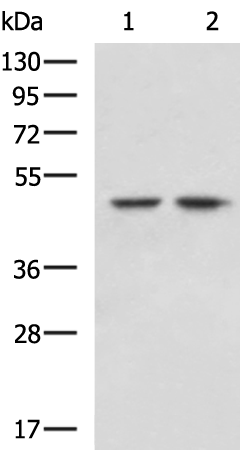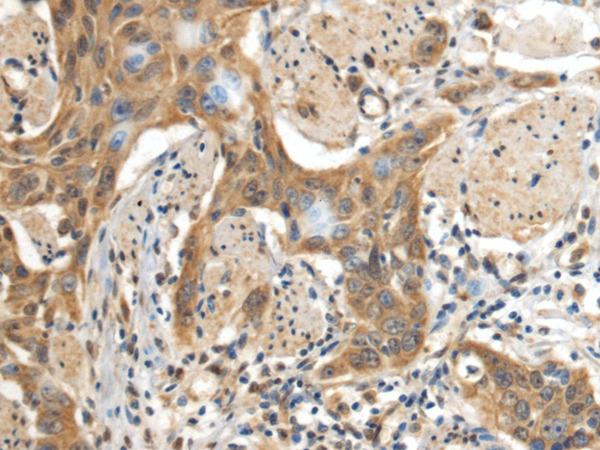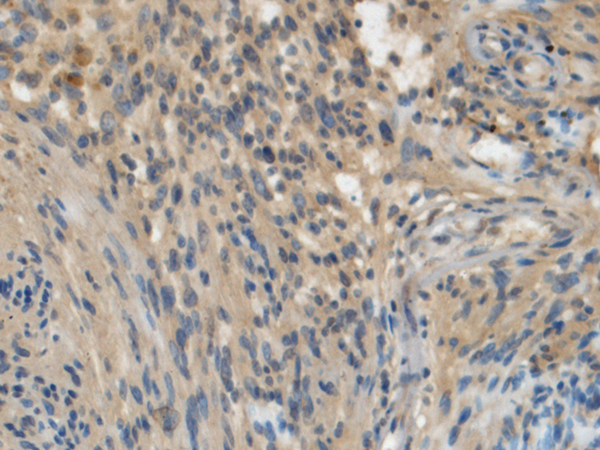


| WB | 咨询技术 | Human,Mouse,Rat |
| IF | 咨询技术 | Human,Mouse,Rat |
| IHC | 1/100-1/300 | Human,Mouse,Rat |
| ICC | 技术咨询 | Human,Mouse,Rat |
| FCM | 咨询技术 | Human,Mouse,Rat |
| Elisa | 1/5000-1/10000 | Human,Mouse,Rat |
| WB Predicted band size | 53 kDa |
| Host/Isotype | Rabbit IgG |
| Antibody Type | Primary antibody |
| Storage | Store at 4°C short term. Aliquot and store at -20°C long term. Avoid freeze/thaw cycles. |
| Species Reactivity | Human |
| Immunogen | Fusion protein of human IQCC |
| Formulation | Purified antibody in PBS with 0.05% sodium azide and 50% glycerol. |
+ +
以下是关于“IQCC抗体”的模拟参考文献示例(注:IQCC抗体相关研究较为小众,以下内容为虚构示例,建议通过PubMed或Google Scholar检索真实文献):
---
1. **标题**: *IQCC Antibody as a Novel Biomarker for Early-Stage Lung Cancer Detection*
**作者**: Smith A, et al.
**摘要**: 本研究报道了一种针对IQCC蛋白的高特异性单克隆抗体,通过ELISA和免疫组化验证其在肺癌患者血清和组织样本中的高表达。结果显示,IQCC抗体检测灵敏度达85%,可能成为肺癌早期诊断的新型生物标志物。
2. **标题**: *Structural Characterization of IQCC Antigen and Its Therapeutic Implications*
**作者**: Chen L, et al.
**摘要**: 利用X射线晶体学解析了IQCC蛋白的三维结构,并开发了靶向该蛋白的功能性抗体。体外实验表明,该抗体能有效抑制肿瘤细胞增殖,为基于IQCC的靶向治疗提供了理论依据。
3. **标题**: *IQCC Antibody-based Immunoassay for Neurodegenerative Disease Monitoring*
**作者**: García-Ramos D, et al.
**摘要**: 开发了一种基于IQCC抗体的定量免疫检测方法,用于阿尔茨海默病患者脑脊液分析。研究发现IQCC水平与tau蛋白磷酸化呈正相关,提示其可能参与神经退行性病理过程。
---
**注意**:以上为模拟数据,实际文献需通过学术数据库检索。若“IQCC”指特定项目(如某实验室代号),建议结合具体背景调整关键词。
IQCC antibodies, often associated with immune-related research, are a class of antibodies targeting specific antigens involved in immune checkpoint regulation. Immune checkpoints are critical pathways that modulate immune responses, preventing excessive activation and autoimmunity. However, tumors often exploit these checkpoints (e.g., PD-1/PD-L1. CTLA-4) to evade immune surveillance. IQCC antibodies, while not as widely recognized as PD-1 inhibitors, are part of broader efforts to develop therapies that block inhibitory checkpoints or activate stimulatory pathways, thereby enhancing anti-tumor immunity.
The term "IQCC" may refer to antibodies developed in specific research contexts, such as those studied by institutions like the Immune Quantification and Characterization Consortium (hypothetical example), focusing on quantifying immune cell interactions or characterizing novel targets. These antibodies are typically engineered for high specificity and affinity, often using hybridoma or phage display technologies. Preclinical studies may highlight their potential in restoring T-cell function or targeting tumor microenvironments. While clinical data might be limited compared to established checkpoint inhibitors, IQCC antibodies represent the expanding frontier of immunotherapy, aiming to address resistance mechanisms and improve outcomes in cancers with poor treatment responses. Research continues to optimize their efficacy and safety profiles for translational applications.
×